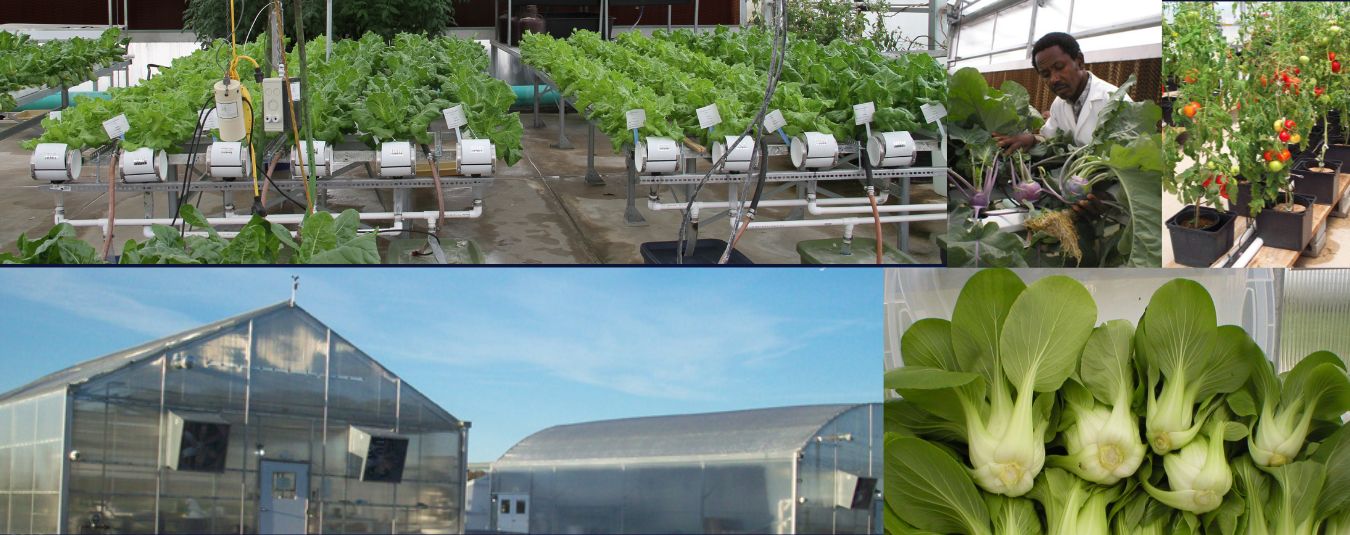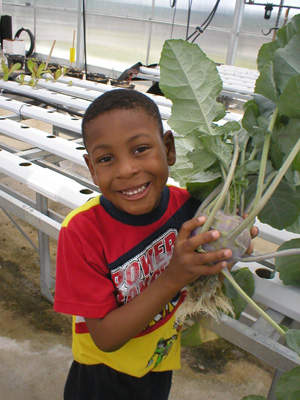Hydroponics

Sustainable Hydroponic Research Program
 Program Mission and Goal
Program Mission and Goal
The goal of the Lincoln University Sustainable Hydroponic Research Program (SHRP) since it was founded in 2005 is to increase the productive capacity of the small-scale hydroponic industry in Missouri, by providing grower education on profitable, but environmentally sustainable methods of soilless and hydroponic crops production.
Projects designed to accomplish this goal utilizes cost effective, simplified technologies and novel strategies for hydroponic crop culture that is consistent with the 1890 mission. That is, providing education, and improving the economic well-being of limited resource individuals, families, and small-scale commercial growers in Missouri, while training future generations of horticultural scientists.
Current research focus is on:
- Screening and evaluation of various vegetable crops, culinary herbs, and small fruits (blueberries and strawberries) in hydroponic systems for niche and specialty markets, and
- Sustainable hydroponic nutrient management. In addition to sustainable food production, the SHRP supports an innovative platform for education in agriculture, biology, biochemistry, and environmental sciences to students at Lincoln University.
- Phase one of the hydroponic research program involved development of 'sustainable small-scale hydroponic cropping of specialty vegetables and herbs for limited resource growers,' and focused on the screening of various vegetables and culinary herbs, and the evaluation of commercial fertilizers as sources of crop mineral nutrition for limited resource hydroponic production.
- The program has been optimizing methods to use non-hydroponically formulated but cheaper, commonly available soluble fertilizers for hydroponic production of various vegetable and herb crops. With the use of a single source soluble compound fertilizer to make hydroponic nutrient solution, the grower need not possess the specialty skills needed to mix correct amounts of different inorganic plant nutrient reagents.
- The grower can sustain the high yield and quality potential of hydroponically grown crops through proper management of plant nutrition. Improved fertilizer-use efficiency increases profitability as the cost of production is reduced by up to 20%. The second phase focused on 'soilless substrate evaluation and nutrient management in sustainable small-scale hydroponic production.' The current and third phase evaluates 'the yield and quality response of vegetable crops to nutrient solution nitrogen composition.'
- This research program benefits the entire society, by educating hydroponic growers on how to conserve water and plant nutrients: using irrigation water and fertilizer more precisely. Hydroponic operations withdraw less ground water, leaving more water for other uses in the community. At an application rate of 0.6 acre-foot of irrigation water to field crops, 50,000,000 gallons less water per year is needed to produce enough tomatoes for one million people in the U.S., using the efficient hydroponic plant nutrient management techniques developed. The amount of water saved here is enough to supply about 400 households or 1,000 people.
What is Hydroponics?
Although hydroponic crop production is often defined as "the cultivation of plants in water," it has a much broader scope. Hydroponics is the term used to describe the numerous ways in which plants can be raised without soil. These methods are also known as soilless gardening and are classified according to the type of growing medium used.
Compared to field or garden crops, hydroponic production indoors (or in greenhouses) has many benefits. The following are some the benefits of soilless/hydroponic food crop production:
Reliable Year-Round Supply - Indoor (controlled environment or greenhouse) hydroponic production is independent of the season and climatic conditions and is therefore a dependable method of supplying high-quality fresh produce consistently throughout the year.
More Crop Harvest Cycles per Year: With enough light and appropriate temperature, hydroponic crops mature faster than those in the outdoor garden do. Where conventional garden cultivation can produce two to three harvests, some hydroponic crops can produce nine to ten harvests annually. This is because pants are grown in water containing dissolved nutrients (fertilizer) growth is not limited by water or nutrient stress. The growth, yield, and quality of hydroponic crops are consistently much higher than with open-field or garden cultivation and produce more reliable harvests throughout the year.
Space Economy: Hydroponic gardening is possible in small spaces. If enough light is available in the growing environment, hydroponic plants can be planted closer together, which results in greater yields per unit area.
Water & Nutrient Economy: Hydroponic gardening consume much less water and plant nutrients than outdoor production because there are no losses due to run-off and nutrient supply is more precise.
Pesticide-free Crop Production: With controlled environment (indoor) hydroponics,
a) Weed control & cultivation: No weeds to control, therefore no cultivation or herbicide application required.
b) Diseases & soil pathogens: Limited risk of plant disease agents, insects, or rodents in the growing medium; therefore, no pesticides are required.
Less Labor for Crop Production:
URLs to publications & Conference Presentations from this Program that are Accessible Online:
- Yield and Mineral Element Concentration of Beetroot in Response to Nutrient Source in Hydroponic Solution
- Influence of Nutrient Source and Growing Environment on Tissue Elemental Concentration and Yield of Cos Lettuce in Hydroponic Culture
- Yield and Leaf Elemental Concentration of Beetroot In Response to Nutrient Solution Composition in Hydroponic Culture
- Influence of Mineral Nutrient Source in NFT System and Temperature on the Yield of Cos Lettuce `Cimmaron'
- Leaf Growth and Nutrient Element Uptake by Adventitious Roots of Collards in Hydroponic Solution of Variable Composition
• Influence of Nutrient Source and Growing Environment on Tissue Elemental Concentration and Yield of Cos Lettuce in Hydroponic Culture
• Yield and Leaf Elemental Concentration of Beetroot In Response to Nutrient Solution Composition in Hydroponic Culture
• Influence of Mineral Nutrient Source in NFT System and Temperature on the Yield of Cos Lettuce ‘Cimmaron’
• Leaf Growth and Nutrient Element Uptake by Adventitious Roots of Collards in Hydroponic Solution of Variable Composition
Acknowledgements
This research project: 'MOLU-HYDROPONICS-5 & 6' is funded by the Evans-Allen and the 1890 Capacity Building Grants of the USDA's National Institute of Agriculture and Food (NIFA). The research is being conducted at Lincoln University of Missouri, Jefferson City, MO 65101; and addresses the NIFA priority area of "Sustainable Agriculture."
 Dr. Jonathan N. Egilla is an Associate Professor of Horticulture, Research Principal Investigator (Soilless Hydroponics Crop Research Specialist) and the director of the Sustainable Hydroponic Research Program at Lincoln University of Missouri, with teaching assignments in the Department of Agriculture. He founded the Lincoln University Sustainable Hydroponic Research Program in 2005, immediately after joining the university. He has been collaborating with small-scale farmers throughout Missouri and nationwide to develop sustainable hydroponic and aquaponic production systems.
Dr. Jonathan N. Egilla is an Associate Professor of Horticulture, Research Principal Investigator (Soilless Hydroponics Crop Research Specialist) and the director of the Sustainable Hydroponic Research Program at Lincoln University of Missouri, with teaching assignments in the Department of Agriculture. He founded the Lincoln University Sustainable Hydroponic Research Program in 2005, immediately after joining the university. He has been collaborating with small-scale farmers throughout Missouri and nationwide to develop sustainable hydroponic and aquaponic production systems.
Prior to his position at Lincoln University of Missouri Dr. Egilla served as an Assistant Research Scientist at the USDA-ARS Southern Plains Agricultural Research Center (SPARC) in College Station, Texas where he acquired sorghum pathogen biology research experience. Dr. Egilla received a bachelor of science in Horticulture (Fruit & Vegetable Production) from Washington State University (Pullman, WA), a master of science3 in Horticulture (Plant Nutrition), and a doctoral degree in Horticulture (Crop Physiology) from Texas A&M University (College Station, Texas). He is an active member of the American Society for Horticultural Science; and served two terms on the USDA-AMS "Plant Variety Protection" Board from 2011 to 2015.
Expertise & Research Focus
- Plant Mineral Nutrition & Management
- Vegetable Crops Physiology
- Integrated Controlled Environment Agriculture & Hydroponic Production
- Drought Physiology & Plant Water Relations.
Contact
Jonathan N. Egilla, Ph.D.Horticulturist (Crop Physiologist)
Program Director & Hydroponic Research Specialist
Cooperative Research Programs Department
212 Foster Hall
E: EgillaJ@LincolnU.edu
P: (573) 681-5621
F: (573) 681-5955
